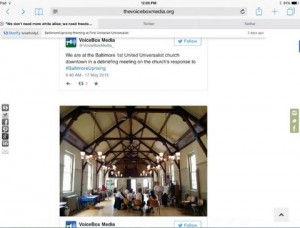
The First Unitarian Universalist Church held a meeting May 17 to have a listening session about the church’s response during the Baltimore Uprising, and how they plan to move forward in supporting the community.
About 20 people, members and visitors, gathered in a half-circle and spoke about their experiences during the April 25 riot following Freddie Gray’s funeral. The Rev. David Olson said he was at the funeral and was surprised at how quickly the crowds became violent after the funeral.
It was an authentic hour-long conversation with many people sharing vulnerably their experiences and feelings.
C.J. Austin, a community activist, said coming to church after the riot was difficult.
“Honestly that Sunday afterwards coming to church – I had a really different feeling coming to church from the neighborhood that I live in – coming to church, I don’t know. I know you guys love me but it felt really out of place because of what was going on in my neighborhood and then coming here.”
Rev. David Olson shared a conversation he had with a long-time friend in Chicago:
“She said: White people. You don’t get it. We don’t want to talk anymore. You don’t get the pain. Go on YouTube and see what’s there. There are plenty of resources that you can study – you don’t need me to be in the room to study because I don’t need to relive that pain.”
Olson shares a conversation he heard with 300 other people:
“This was the richest conversation I’ve had a chance to listen to. What one of the sisters said toward the end was: we need to build a diff movement – this must be a movement of sustainability, this must be a movement of intersectionality and this must be a movement of spirituality. Some of us chant and pray before we go to a demonstration. Some of us show up with sage to anoint one another. Some of us carry bottles of rose water. Some of us have a banana and if we notice one of our brothers needs to get down on his energy, we say eat this. Some of us see people burning themselves out in this movement and we don’t say, “You need to learn to say no.” We say, “What’s the work you’re doing? I can do that work and now you take a day off.”
This notion that this a long haul struggle is something that is so comforting for me and the fact that all these leaders were so much younger than I gave me such hope about what might happen in this country that I love and this people that I adore. I have a new sense of possibility for us.”
C.J. Austin, a member of the church and a 4-year resident of Baltimore, shares emotionally about what she sees in her neighborhood.
“I went to one talk last week and what one of the ministers said is: We don’t need more white allies. We need freedom fighters. And it’s true. Because just like walking through my neighborhood and I see teenage boys just minding their own business and they’re in handcuffs with six cops standing with them and they haven’t even done anything. And there’s people that they will never have to worry about their son being in that situation and I’m tired of seeing that. For me, that’s not something I grew up seeing, it’s stuff I saw on TV but now I’m seeing it in a reality that I live in.”

